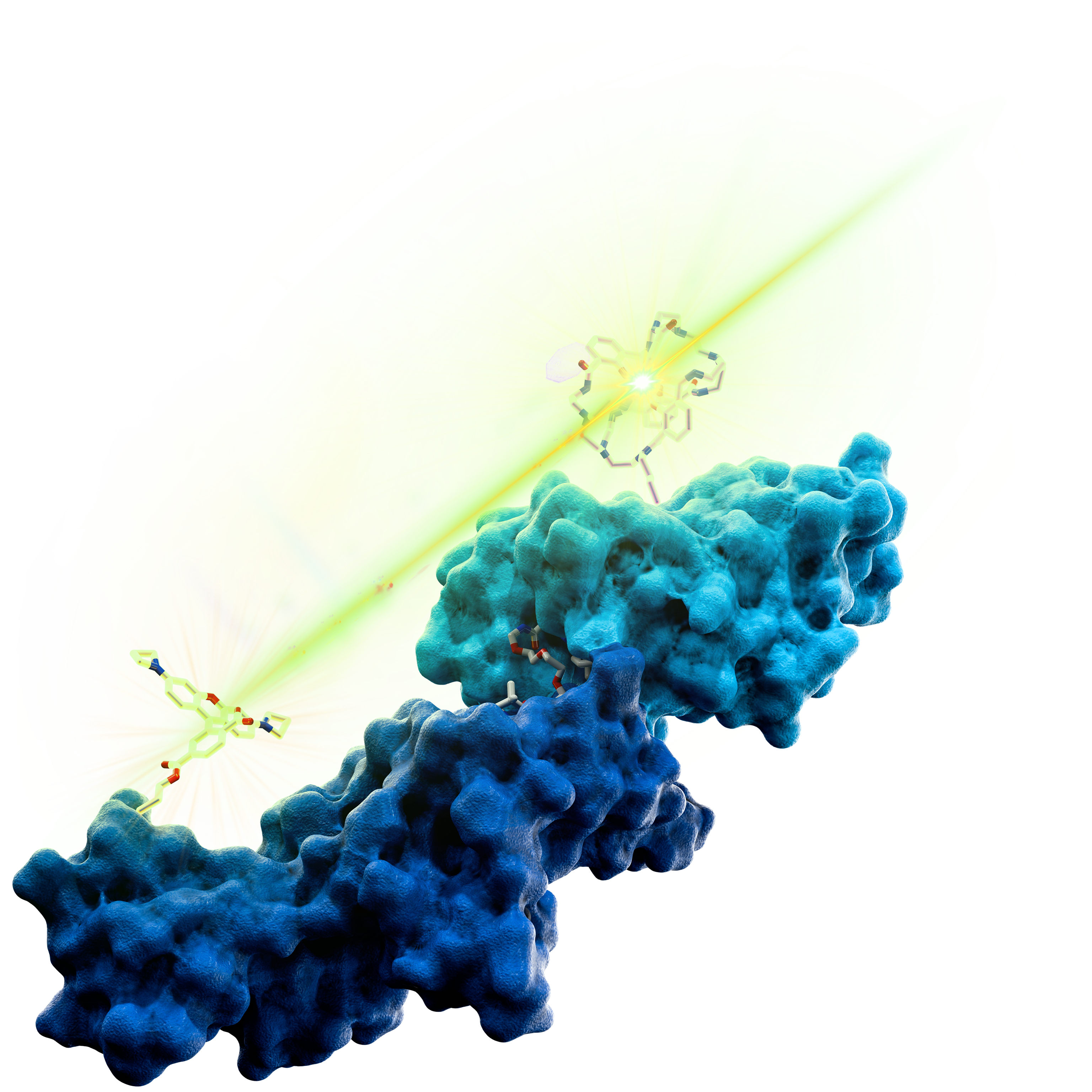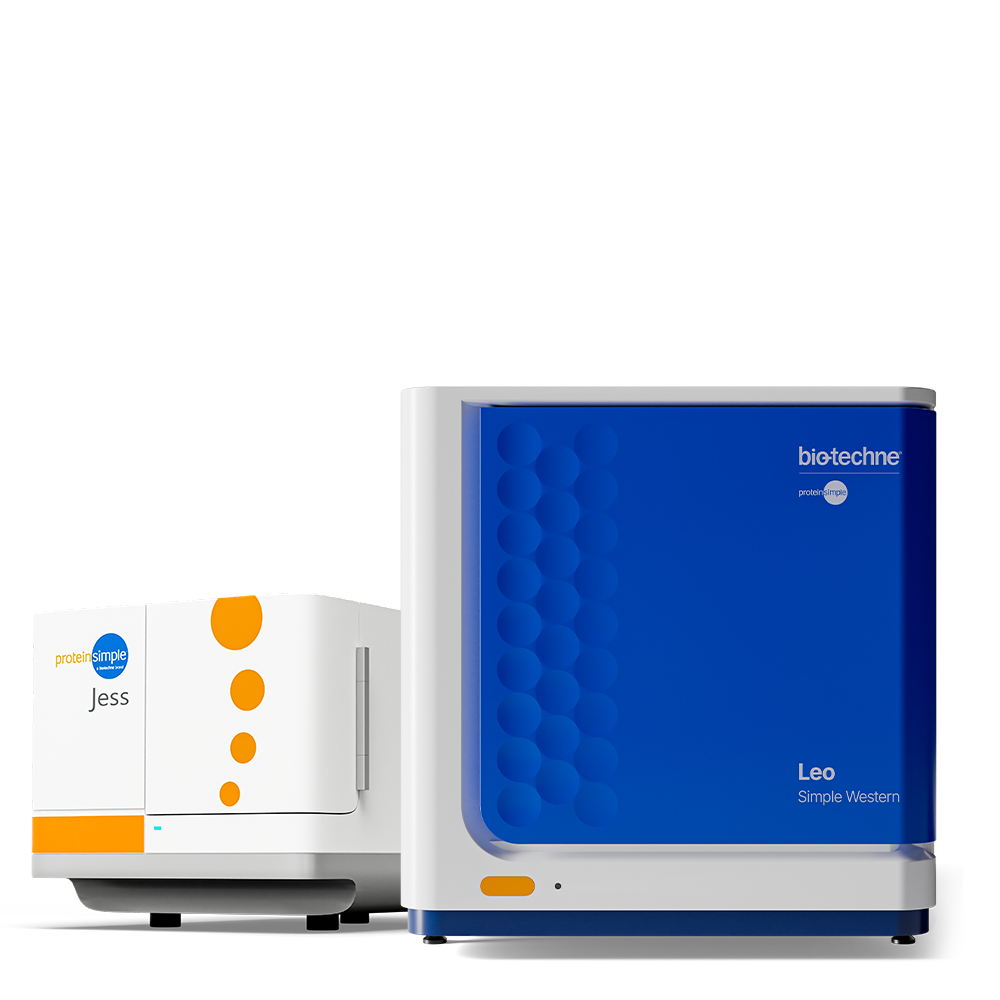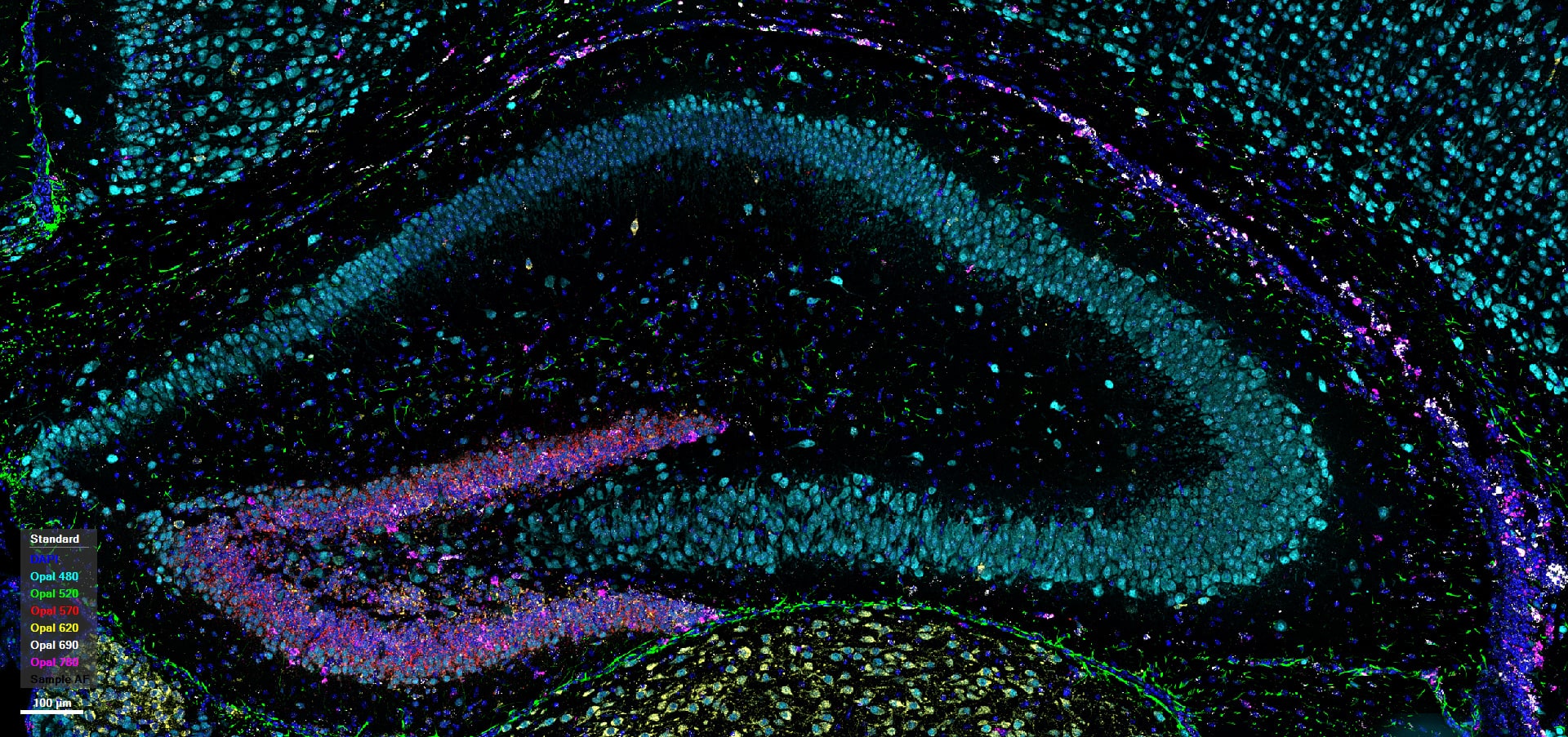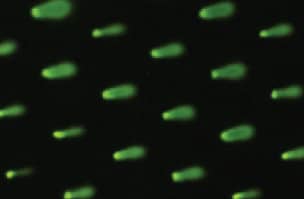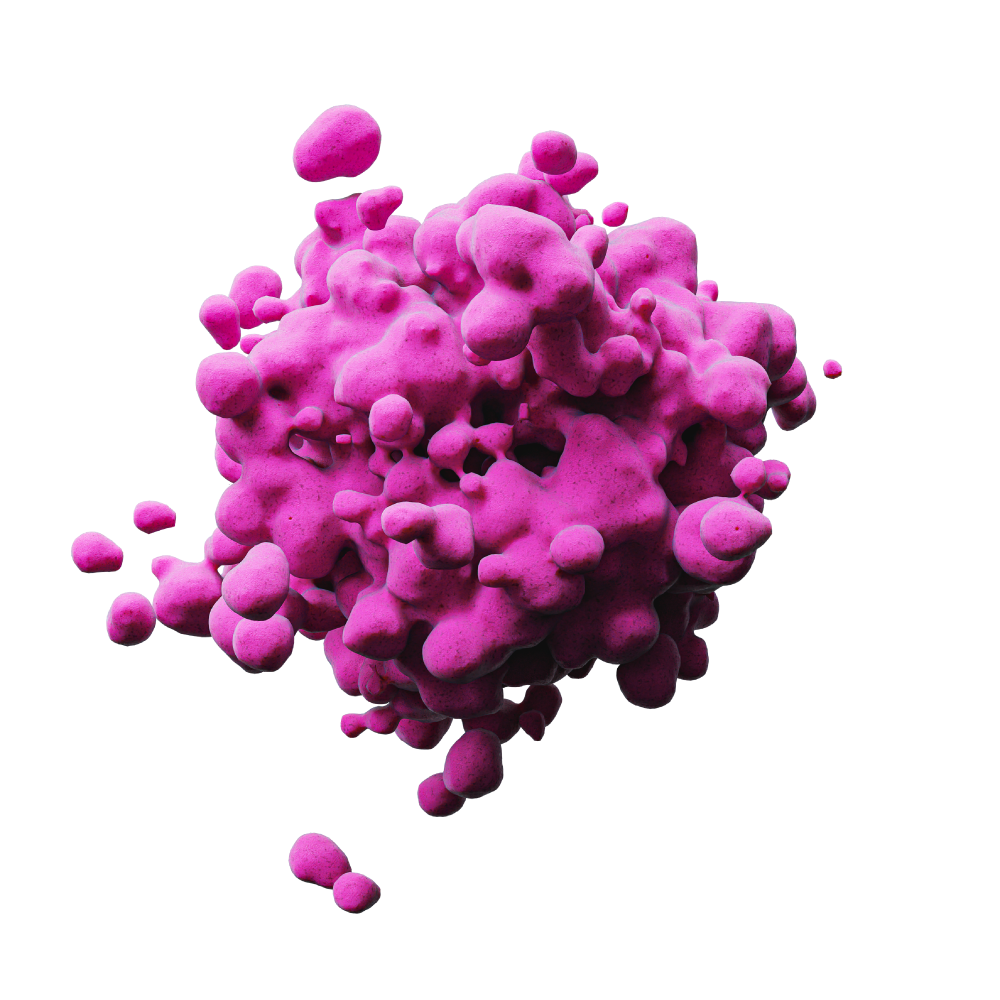Successful development of bifunctional small molecule Degraders (a general term encompassing PROTAC® molecules, Degronimids, SNIPERs and uSMITE® molecules) and molecular glues requires a robust screening cascade. While the same is true for any drug discovery/medicinal chemistry program, the distinct mode of action of Degraders compared to standard small molecule inhibitors, requires a set of assays that address a specific and differentiated set of questions.
Multiple orthogonal assays, exploring target engagement by the Degrader and ternary complex formation, target protein ubiquitination and degradation, as well as the downstream effect of protein knockdown, will maximize the chance of successful Degrader development. An example assay workflow that aims to address these different aspects of Degrader activity is shown below.
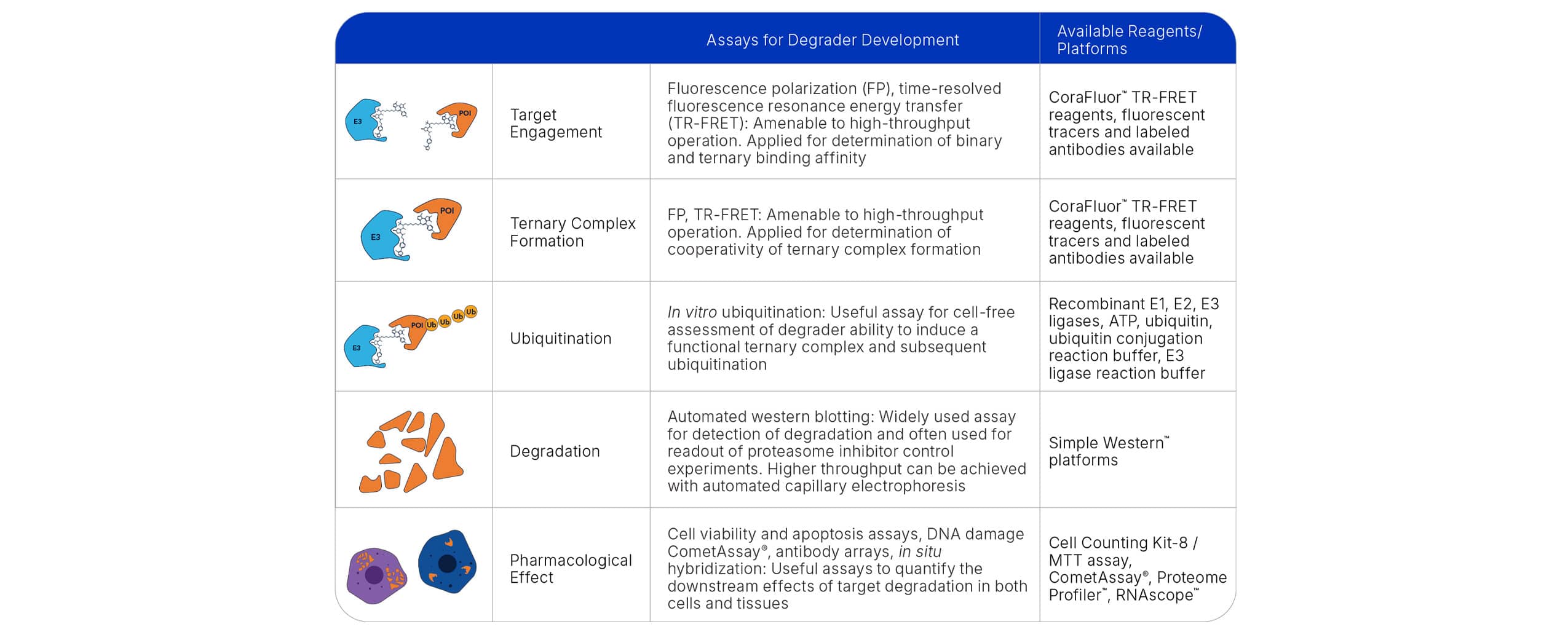
Target Engagement and Ternary Complex Formation
A starting point of bifunctional Degrader design is the identification of a suitable ‘exit vector’ on a ‘warhead’ ligand for your target protein of interest (POI) and E3 ligase ligand. The exit vector is the point of attachment for the linker group and should allow linker attachment without significant loss of ligand-protein binding affinity.
The formation of a ternary complex between the POI, Degrader and E3 ligase defines the underlying Degrader mechanism of action. Ternary complex formation enables transfer of ubiquitin from the ligase to the POI.
Explore target engagement of candidate Degraders with CoraFluor probes and TR-FRET/FP Assays to establish whether your Degrader molecules retain binary binding affinity. Bio-Techne provides a range of products to help you explore ternary complex formation including in vitro ubiquitination assays, assay components and antibodies. Cell-based TR-FRET/FP assays can also provide information relating to cellular permeability.
Ubiquitin Proteasome System
Bio-Techne provides a range of products to help you explore ubiquitin biology and ternary complex formation. The rapidly expanding portfolio includes highly active E3 Ubiquitin Ligases, including SKP2, VHL, Cereblon (CRBN) and DCAF proteins, as well as assay kits and components, and antibodies. We also provide Cullin-Rbx complexes (including neddylated cullins) that can be coupled to your purified substrate binding complexes to generate active ligases.
Assays for Degradation
Is the protein of interest degraded in cells following Degrader treatment? The traditional method for answering this question is a western blot assay. This is despite well-known drawbacks associated with traditional western blotting, including poor throughput, reproducibility, and quantification. Instead, Simple Western™ is a high-throughput, fully automated, and fully quantitative capillary electrophoresis approach to western blotting that can be effectively applied to Degrader development workflows.
Products for Exploring Protein Degradation
Simple Western Assays for Targeted Protein Degradation
Simple Western Assays for Targeted Protein Degradation
Profile Degrader activity using high throughput Simple Western systems. Highly reproducible and quantitative results allow for easy determination of DC50 values. Fully automated Simple Western assays allow separation and analysis of proteins by size (or charge) from 2 kDa to 440 kDa in as little as 3 hours.
Western Blot and Simple Western Validated Antibodies
Western Blot and Simple Western Validated Antibodies
Bio-Techne provides a wide range of primary antibodies validated for western blot and Simple Western assays. We also offer enzyme- and fluorochrome-conjugated secondary antibodies and antibodies for the most commonly used epitope tags for the detection of tagged proteins by Western blot. A variety of size options are available, including bulk and sample sizes to ensure that you can find what you need for your research.
MolBoolean Protein Proximity Kit
MolBoolean Protein Proximity Kit
The MolBoolean™ Mouse/Rabbit Assay Kit (Catalog # MolB00001) is a state-of-the-art tool for analyzing protein proximity within cells and tissues using advanced immunofluorescent detection. Specifically designed to quantify the levels of proteins A and B, and their interactions (AB), this kit works with user-selected mouse and rabbit primary antibodies.
Downstream Pharmacology
Exploring the resulting phenotype following successful Degrader-mediated protein degradation enables an understanding of the biological role of the POI. A relevant question to ask is: “does degradation offer a more desirable or differentiated phenotype compared to inhibition?” Our downstream pharmacology assays provide researchers with methods to explore and understand the biological consequences of targeted protein degradation.
Products for Exploring Downstream Pharmacology
In Situ Hybridization with RNAscopeTM
In Situ Hybridization with RNAscopeTM
RNAscope in situ hybridization technology is a powerful tool that allows you to spatially map and quantify specific target mRNAs in intact cells and tissues. Detect up to 12 RNA targets simultaneously using the RNAscope HiPlex assay or combine the assay with IHC or IF on the same slide to investigate mRNA and protein co-expression. Catalog probes are available for over 23,000 targets in 140+ species and can also be made-to-order. Discover how your Degrader affects downstream gene expression using RNAscope.
Proteome ProfilerTM Antibody Arrays
Proteome ProfilerTM Antibody Arrays
Proteome Profiler Antibody Arrays are a simple, high throughput and cost-effective tool for early-stage analyte profiling. Our antibody arrays have superior specificity, low background noise and no cross-reactivity means that you can count on this assay for clear and consistent data. Use our antibody arrays as part of your PROTAC® assay cascade to explore the downstream consequences of Degrader-induced protein knockdown.
CometAssay
CometAssay
Degradation of targets can have cytotoxic effects and can interfere with transcription, resulting in DNA damage. Bio-Techne offer CometAssay, a sensitive technique for measuring DNA damage in single cells. Can be used to detect single- and double-stranded DNA breaks or to detect double-stranded DNA breaks only. For more information about CometAssay and how it can be used, please browse the products with the link below.
Cell Viability and Proliferation Assays
Cell Viability and Proliferation Assays
The viability and proliferation of a cell population after treatment with a Degrader can help to evaluate the toxicity and effectiveness of a series of candidate Degraders. Bio-Techne provides a range of assay kits and reagents to determine how your candidate Degrader affects cells.
Apoptosis Assay
Apoptosis Assay
With the Annexin V-FITC Apoptosis Detection Kit you can detect and measure apoptotic cells to quantify the extent of cell death resulting from targeted protein degradation.
Featured Product: Cell Counting Kit-8
Featured Product: Cell Counting Kit-8
A ready-to-use solution for high throughput cell viability and proliferation assays.
Related Resources for Targeted Protein Degradation Assays
Webinar: Advanced TPD Research with Automated Western Blotting
Webinar: Advanced TPD Research with Automated Western Blotting
Dr Gary Allenby, CSO at Aurelia Bioscience, shares how their research team uses Simple Western systems to rapidly and reproducibly quantify protein knockdown following treatment with Degraders.
Application Note: Automated Profiling of PROTAC®-induced Degradation
Application Note: Automated Profiling of PROTAC®-induced Degradation
Learn from Protein Simple how fully automated Simple Westerns can be used to profile degradation of cereblon neosubstrates using cereblon-recruiting Degraders and IMiDs.
PROTAC® is a registered trademark of Arvinas Operations, Inc., and is used under license.

